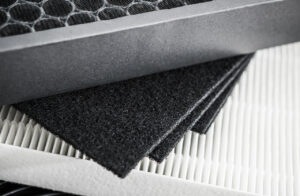
The EPA (Environmental Protection Agency) claims that our indoor air quality (IAQ) can be 2 to 5 times worse than the outside—yikes! So what causes bad IAQ and what’s there to do about it? Here are five tips to keep in mind.
What Pollutes Our Inside Air?
Every house has a few main culprits when it comes to bad IAQ. There’s almost no way to avoid these pollutants and sources altogether, but there are ways to reduce their contribution to bad indoor air quality.
- Old building materials like asbestos and mold can contribute to bad IAQ.
- Household chemicals and cleaners, such as laundry detergent, can also release harmful chemicals into the air, which can cause allergies and asthma attacks.
- Unvented combustion sources like gas stoves can also release fumes into your home’s air.
- HVAC systems are another source of contaminants, including dust, pollen, and even small insects and their waste.
- Poor ventilation can cause your indoor air to become stale and stagnant, meaning pollutants stay put.
What Are the Effects of Bad Indoor Air Quality?
Bad IAQ can lead to a variety of negative health effects, both short-term and long-term. Some people may experience headaches, dizziness, and eye or throat irritation. These symptoms can be fixed immediately if you’re able to find the source and remove it.
Others may suffer from long-term effects like difficulty breathing, fatigue, asthma attacks, and even cancer. Children and older adults are more sensitive to bad IAQ than the average person, so if you or someone in your household suffers from any of these symptoms, make sure to get your home tested for poor indoor air quality as soon as possible.
And once you discover what’s causing the bad indoor air quality, or you’d just like to freshen things up, here are some tips to help boost your air quality:
1. Change Your AC Filters
Changing all the filters in your home on a regular basis is one of the easiest and most effective ways to improve your indoor air quality. Not only do dirty filters reduce airflow and increase energy costs, but they also act as a magnet for indoor air pollutants, trapping dust, dirt, pollen, and other allergens.
You should replace your air filter every couple months for maximum efficiency and good air flow. Not only will your body thank you, but so will your energy bill!
2. Make the Switch to Natural Cleaning Products
Traditional cleaning products contain lots of harsh chemicals that can irritate your skin and lungs, causing indoor air quality to suffer. Instead, try using more natural cleaning products like lemon juice or vinegar for a safer and healthier way to clean your home.
3. Use Your Cooking Vents
When you’re cooking, turn on your vent and let the air move from the kitchen to another room. Not only does this reduce heat buildup in your kitchen, but it also helps remove airborne pollutants like smoke and steam that can contribute to poor IAQ.
And since many stoves and ovens use natural gas, make sure to turn on the vent when you’re using one of these appliances. This prevents excess carbon monoxide and other harmful gases from building up.
4. Clean Air Ducts and Vents
Regularly cleaning your air ducts and vents helps remove built-up dust, dirt, and other pollutants. You can use a vacuum with a brush attachment or an air duster to clean your vents, but to give your ducts a good clean, you’ll need to hire a professional.
They’ll be able to inspect the entire system and clean it thoroughly with a powerful vacuum, helping to keep your home’s air clear of contaminants. It’s a good idea to get your ducts cleaned every 3 to 5 years, and doing so will make your air cleaner and help your AC work better.
5. Buy Indoor Plants
A dual-purpose suggestion: improve your indoor air quality and beautify your home! Indoor plants have been shown to help purify the air and remove contaminants like formaldehyde and benzene, so they’re a great addition to any home.
Some good options include aloe vera, spider plants, snake plants, and many others. Just make sure you clean your indoor plants regularly to keep them free of dust, dirt, and other allergens.
By following these simple tips, you can easily improve the indoor air quality in your home and keep your family safe from the negative effects of poor IAQ.
Breathe Easy With Shriver Mechanical
Your home should be a safe space, not a source of irritation and health problems. That’s why we offer a full range of services to help you get the best indoor air quality possible. From expert installations, repairs, and maintenance, to air filtration systems and cleaning, our team at Shriver Mechanical is here to help with everything HVAC-related. Schedule an appointment today or request an estimate!
